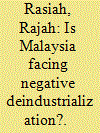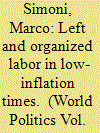|
|
|
Sort Order |
|
|
|
Items / Page
|
|
|
|
|
|
|
| Srl | Item |
| 1 |
ID:
124901


|
|
|
|
|
| Publication |
2013.
|
| Summary/Abstract |
China-Brazil ties can be elevated from strategic partnership to an overall strategic partnership by promoting the sustainable development of both countries. A closer examination at this "deindustrialization" issue can also help set up a new type of big power relations.
|
|
|
|
|
|
|
|
|
|
|
|
|
|
|
|
| 2 |
ID:
112502


|
|
|
|
|
| Publication |
2012.
|
| Summary/Abstract |
There has been considerable concern in Latin America over the implications of increased competition from China for local industry. These concerns include the possibility of "deindustrialization," the increased "primarization" of the region's exports and the difficulties of upgrading manufactured exports into higher technology products. This article examines the impact of Chinese competition both in the domestic market and in export markets on Brazilian industry. It documents the increased penetration of Chinese manufactures in the Brazilian market and the way in which Brazilian exports have lost market share to China in the US, European Union and four Latin American countries. Brazil, because of its more developed and locally integrated industrial sector, is not typical of other Latin American countries and the article also discusses the relevance of the Brazilian experience for the region as a whole.
|
|
|
|
|
|
|
|
|
|
|
|
|
|
|
|
| 3 |
ID:
178998


|
|
|
|
|
| Summary/Abstract |
Globalization and automation have contributed to deindustrialization and the loss of millions of manufacturing jobs, yielding important electoral implications across advanced democracies. Coupling insights from economic voting and social identity theory, we consider how different groups in society may construe manufacturing job losses in contrasting ways. We argue that deindustrialization threatens dominant group status, leading some white voters in affected localities to favor candidates they believe will address economic distress and defend racial hierarchy. Examining three US presidential elections, we find white voters were more likely to vote for Republican challengers where manufacturing layoffs were high, whereas Black voters in hard-hit localities were more likely to vote for Democrats. In survey data, white respondents, in contrast to people of color, associated local manufacturing job losses with obstacles to individual upward mobility and with broader American economic decline. Group-based identities help explain divergent political reactions to common economic shocks.
|
|
|
|
|
|
|
|
|
|
|
|
|
|
|
|
| 4 |
ID:
166369


|
|
|
|
|
| Summary/Abstract |
Decoupling energy consumption and carbon emissions from economic growth is at the core of the climate change debate: successful decoupling is evidence that efficiency measures can be economically sustainable. In this article, the authors analyze the underlying nature of this decoupling in the European Union from 1990 to 2014. The objective is to quantify the role of structural changes and the effectiveness of energy efficiency measures in lowering energy consumption. We decompose final energy consumption per sector, including households and transportation into three key drivers: economic growth, economic structure and energy intensity. Our results show that a significant part of the reduction in energy consumption can be attributed to structural changes, such as deindustrialization, while an equally significant part can be attributed to energy efficiency. This further corroborates the idea that much of the observed decoupling is virtual; largely due to outsourcing of energy intensive activities. Energy is then imported in the form of embodied energy in goods and services. The dynamics of these effects suggest that a shift in our understanding of decoupling is necessary. The implementation of effective energy efficiency policies, accounting for embodied energy, remain of high priority.
|
|
|
|
|
|
|
|
|
|
|
|
|
|
|
|
| 5 |
ID:
108798


|
|
|
|
|
| Publication |
2011.
|
| Summary/Abstract |
This paper seeks to examine whether Malaysia is facing negative deindustrialization by examining value-added, trade and productivity trends over the period 1990-2005. The evidence produced in the paper is concrete enough to confirm that Malaysia is facing negative deindustrialization. While it is typical, as part of the process of structural change, to see a rise and fall in the share occupied by manufacturing in the GDP, the evidence shows that Malaysia is indeed facing premature deindustrialization with a trend slowdown in manufacturing value-added, trade performance and productivity since 2000. Not only has the trade performance of manufacturing been falling, manufacturing labour productivity has also slowed down, with the key sectors such as electric-electronics, textiles and transport equipment showing either negative or low productivity growth since 2000. Malaysian industrial policies have been fairly successful in connecting with the global value chains of multinationals and in developing resource-based industries, but have not achieved the same success in stimulating their transformation to high value-added activities. The lack of effective institutional change, partly explained by ethnic policies, is advanced as the prime reason for the setting in of negative deindustrialization in Malaysia.
|
|
|
|
|
|
|
|
|
|
|
|
|
|
|
|
| 6 |
ID:
119693


|
|
|
|
|
| Publication |
2013.
|
| Summary/Abstract |
This article presents fresh empirical data showing that policy alignment between center-left governments and trade unions was a sustained feature of European politics between 1974 and 2005. This contradicts expectations of a wide delinkage between the electoral left and labor as a consequence of globalization, deindustrialization, and unionization decline. However, structural economic change has altered the policy field so that sustained policy alignment can no longer be explained by existing theoretical frameworks.
Based on a theoretical argument and a multivariate empirical test, the article contends that policy alignment is likelier to occur if labor plays an important role in economic management at the microlevel and the industry level and if unions are politically cohesive agents thanks to powerful confederation leadership supported by democratic decision-making practices. In making its case, the article bridges the literatures on comparative capitalism and party politics, in order to account for change and continuity in policy-making processes
|
|
|
|
|
|
|
|
|
|
|
|
|
|
|
|
| 7 |
ID:
086717


|
|
|
|
|
| Publication |
2009.
|
| Summary/Abstract |
This study examines the effects of the first globalization on the late period Ottoman economy as well as the impact of the second globalization on the Turkish economy for the last three decades. Since the demand of Western industrial countries for Ottoman agricultural products was high, the production and export of such goods increased. Improved terms of trade had some positive short term impact on the exporting agricultural sector, but resulted in a massive deindustrialization all around the Empire. Again during the second globalization, Turkish foreign trade has increased, and a few manufacturing sectors have shown improvements because of the global competitive forces. However, Turkish agriculture has suffered, and trade and current account deficits have grown persistently, with foreign debt displaying certain similarities with the infamous Ottoman public debt.
|
|
|
|
|
|
|
|
|
|
|
|
|
|
|
|
| 8 |
ID:
173746


|
|
|
|
|
| Summary/Abstract |
This review paper provides a new narrative by combing through the experiences of structural transformation among developing countries and discussing the roles of government and market in different contexts. Country performance has been influenced by the prevailing development thinking: the structuralism in the 1950s–1970s, which stresses an active government's role to overcome market failures for industrialization, and the neoliberalism in the 1980s–present, which advocates for eliminating government failures to build up a well‐functioning market. We find that almost all countries failing by following structuralism in their industrialization and neoliberalism in their transition to a market economy, and the few countries successful in catching up have a few characteristics that go against the prevailing structuralism and neoliberalism. The new structural economics, generated from the experiences of successful East Asian economies and proposing active facilitating roles of government in a market economy to remove market failures, will gain traction and take root.
|
|
|
|
|
|
|
|
|
|
|
|
|
|
|
|
| 9 |
ID:
157200


|
|
|
|
|
| Summary/Abstract |
Contemporary urbanization in India is in transition and this, along with the continuation of a ‘top heavy’ urban structure and gradual deindustrialization, is characterized by faster growth of informal employment, a declining trend of urban-ward migration of males, the slow down in the growth of cities and towns and the emergence of new urban centres. Given this immediate backdrop, this paper examines the contemporary processes and emerging forms of urban transition in West Bengal, with its longstanding history of ‘mono-centric’ urbanization. It reveals that urbanization in the state is no longer confined to a few pockets, as many new urban centres have emerged away from them and small towns are growing at relatively faster rates compared to the cities. But the underlying factors of this transition are not associated with the dispersal of economic activities and employment opportunities away from the metropolises. Furthermore, the study is sceptical about the significance of this emerging form of urbanization fuelled by the growth of small cities and towns which have a weak economic base, a crisis of urban governance and inadequate access to basic amenities.
|
|
|
|
|
|
|
|
|
|
|
|
|
|
|
|
| 10 |
ID:
103696


|
|
|
|
|
| Publication |
2011.
|
| Summary/Abstract |
Racial earnings inequalities in the United States diminished significantly over the three decades following World War II, but since then have not changed very much. Meanwhile, black-white disparities in employment have become increasingly pronounced. What accounts for this historical pattern? Sociologists often understand the evolution of racial wage and employment inequality as the consequence of economic restructuring, resulting in narratives about black economic fortunes that emphasize changing skill demands related to the rise and fall of the industrial economy. Reviewing a large body of work by economic historians and other researchers, this article contends that the historical evidence is not consistent with manufacturing- and skills-centered explanations of changes in relative black earnings and employment. Instead, data from the 1940s onward suggest that racial earnings inequalities have been significantly influenced by political and institutional factors-social movements, government policies, unionization efforts, and public-employment patterns-and that racial employment disparities have increased over the course of the postwar and post-1970s periods for reasons that are not reducible to skills. Taking a broader historical view suggests that black economic fortunes have long been powerfully shaped by nonmarket factors and recenters research on racial discrimination as well as the political and institutional forces that influence labor markets.
|
|
|
|
|
|
|
|
|
|
|
|
|
|
|
|
|
|
|
|
|